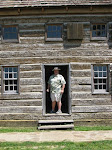Today marks the 102nd anniversary of the birth of Orson Welles. He has been missing from the world stage for over a generation now. The film and stage industries will always owe him immensely for what he brought to them and for the treatment his genius received at the hands of a Hollywood film cartel that resented outsiders.
 |
| Welles at 21 |
There will never be another cinematic alchemist quite like Orson Welles. Interested in experiment and discovery in the performing arts, he was a remarkably talented actor, writer, director, producer, and more. Before he was thirty, he had terrified the nation with his realistic Halloween presentation of H.G. Wells's War of the Worlds (1938) and awed film audiences with Citizen Kane (1941). Welles was already a rather contentious artist when he achieved almost instant fame. His creativity and drive helped label him as a difficult, if not reckless, personality and he never endeared himself to the Hollywood in-crowd. As a result his film legacy was limited to a number of noteworthy productions and a long list of unfinished projects, and pipe dreams. The achievement of early fame and the fast and loose pursuit of art at almost any cost gave him a unique perspective on creativity and the entertainment industry. Although he appreciated his solitude he was never one to shy from the limelight and delighted in interviews and personal appearances where he could deliver and endless stream of anecdotes in his rich, unforgettable baritone voice.
And here from his 1958 film, Touch of Evil, is the classic "crane shot" that makes an appearance in every college film class.
In later life Welles became known as a great conversationalist. From 1974, here are the highlights from an interview with the British broadcaster, Sir Michael Parkinson. Welles talks about politics, bullfighting, his friendship with Ernest Hemingway, personal heroes (Winston Churchill, Gen. George S, Marshall), the power of criticism, the film industry, the stars (he thought James Cagney was far and away the best), his attitude toward his films, and future projects. It's a quick and entertaining 37 minutes and in my mind reveals much about the man who foreshadowed the independent film movement we know today.
Sources
Photos and Illustrations:
Welles portrait, Library of Congress (Carl Van Vechten, photographer, March 1, 1937)
Kehr Quotation: chicagoreader.com, review of The Lady of Shanghai
Text:
Title quote, Welles, from the film, F For Fake (1973)

No comments:
Post a Comment